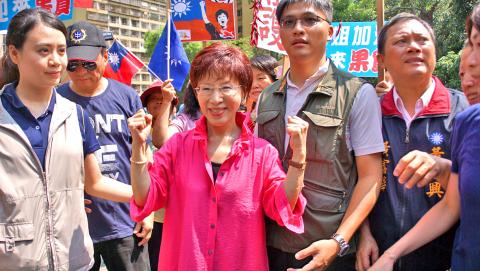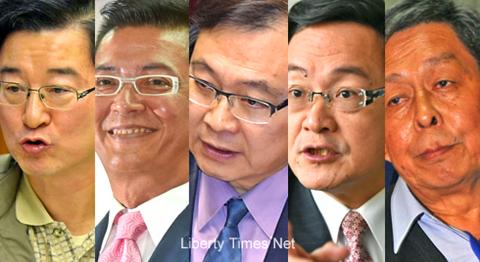The Chinese Nationalist Party (KMT) will not tolerate members “waving a blue flag to oppose the blue flag,” (打著藍旗反藍旗) KMT Chairman Eric Chu (朱立倫) said yesterday after five vocal critics of the party were unexpectedly kicked out.
“There are a few members who have repeatedly criticized the party in public, against the consensus of senior party members that the party has to stay united to win the elections [in January],” Chu told the party’s Central Standing Committee at its weekly meeting.
Chu was adapting the phrase “waving a red flag to oppose the red flag,” which refers to those who pretended to adhere to Mao Zedong’s (毛澤東) teachings, but actually tried to oust him during China’s Cultural Revolution.

Photo: CNA
“It is unacceptable for party members to wave a blue flag to oppose the blue flag,” Chu said.
Chu’s statement came after Legislator Chi Kuo-tung (紀國棟), Taipei City Councilor Lee Ching-yuan (李慶元), former Taipei City councilor Yang Shih-chiu (楊實秋), former legislator Chang Sho-wen (張碩文) and alternative Central Committee member Lee Po-jung (李柏融) were expelled from the party.
The KMT’s Central Evaluation and Disciplinary Committee called a meeting yesterday morning to revoke the memberships of the five party members. The Central Standing Committee approved the resolution in the afternoon.

Photo: Liberty Times
Chu said the party “had no choice but to” exert the disciplinary measures because the five had launched “malicious attacks” on the party, “even trying to divide the KMT.”
From past experience, it is evident that “a divided KMT can never win,” Chu said, adding that senior party members whom he recently visited — including former KMT chairmen Lien Chan (連戰) and Wu Poh-hsiung (吳伯雄), and Legislative Speaker Wang Jin-pyng (王金平) — told him that the KMT has to stay united to win the elections.
The expulsion of the five came four days ahead of the party’s national congress on Sunday at which the KMT is to officially decide whether Deputy Legislative Speaker Hung Hsiu-chu (洪秀柱) will be its presidential candidate.
At last week’s Central Standing Committee meeting, Chu had countered those who have quit or plan to quit the KMT, with some citing Hung’s stance on cross-strait relations, saying their moves have more to do with their own nominations than whether Hung would secure the presidential nomination.
“The central mission of the national congress should be to bring together the party to win the presidential and legislative elections,” Chu said yesterday.
Lee Po-jung — who had said he would propose at Sunday’s congress that Hung’s nomination be voted on, as opposed to the previous practice in which a candidate only needed to gain applause to be handed the nomination — yesterday said that he was “disappointed” that the KMT had expelled those “who tell the truth” about the party.
“I will be attending the national congress to exercise my rights and obligations as a member. The KMT was not democratic enough, as it used its own discretion to revoke my membership without giving me a chance to explain myself,” Lee Po-jung said.
The KMT said in a statement that Lee Po-jung had committed “a grave violation of party discipline” by attempting to sue Chu, KMT Secretary-General Lee Shu-chuan (李四川) and Hung for forgery and fraud, questioning the authenticity of the signatures that Hung collected to back her candidacy during the first stage of the party’s presidential primary.
Chi, Lee Ching-yuan, Yang and Chang were expelled because they criticized the KMT on TV talk shows, the statement said.
The expulsion of Chi immediately ousted him from the legislature because he represents the KMT as a legislator-at-large.
Chi’s role is to be filled by National Chengchi University adjunct associate professor Mignonne Chan (詹滿容).
Unfazed by the decision, Chi said that he felt “at ease,” but was worried about the “pathetic” state the “party leader” has gotten the KMT into.
“Even though I made some mistakes, it was the party’s leader who made the serious ones. An ordinary party member cannot do much harm to the party, but the leader can destroy it when he gets things wrong,” Chi said, urging the party’s upper echelons to undergo thorough self-reflection.
In April, Chi paid a fine of NT$4 million (US$127,910) to the KMT for his absence from legislative plenary sessions and his failure to raise sufficient donations as a legislator-at-large.
Chi was hoping to secure a chance to compete against Legislator Yen Kuan-hen (顏寬恆) for the nomination as a legislative candidate for the second constituency of Taichung, which is Chi’s hometown.
The KMT nominated Yen in the constituency and suggested that Chi run in the seventh constituency instead, but Chi rejected that option.
“If I accepted being drafted to run in the seventh constituency, would the KMT treat me like a treasure? Now I am a weed that the party wants to eradicate,” he said.

CHAOS: Iranians took to the streets playing celebratory music after reports of Khamenei’s death on Saturday, while mourners also gathered in Tehran yesterday Iranian Supreme Leader Ayatollah Ali Khamenei was killed in a major attack on Iran launched by Israel and the US, throwing the future of the Islamic republic into doubt and raising the risk of regional instability. Iranian state television and the state-run IRNA news agency announced the 86-year-old’s death early yesterday. US President Donald Trump said it gave Iranians their “greatest chance” to “take back” their country. The announcements came after a joint US and Israeli aerial bombardment that targeted Iranian military and governmental sites. Trump said the “heavy and pinpoint bombing” would continue through the week or as long

TRUST: The KMT said it respected the US’ timing and considerations, and hoped it would continue to honor its commitments to helping Taiwan bolster its defenses and deterrence US President Donald Trump is delaying a multibillion-dollar arms sale to Taiwan to ensure his visit to Beijing is successful, a New York Times report said. The weapons sales package has stalled in the US Department of State, the report said, citing US officials it did not identify. The White House has told agencies not to push forward ahead of Trump’s meeting with Chinese President Xi Jinping (習近平), it said. The two last month held a phone call to discuss trade and geopolitical flashpoints ahead of the summit. Xi raised the Taiwan issue and urged the US to handle arms sales to

BIG SPENDERS: Foreign investors bought the most Taiwan equities since 2005, signaling confidence that an AI boom would continue to benefit chipmakers Taiwan Semiconductor Manufacturing Co’s (TSMC, 台積電) market capitalization swelled to US$2 trillion for the first time following a 4.25 percent rally in its American depositary receipts (ADR) overnight, putting the world’s biggest contract chipmaker sixth on the list of the world’s biggest companies by market capitalization, just behind Amazon.com Inc. The site CompaniesMarketcap.com ranked TSMC ahead of Saudi Aramco and Meta Platforms Inc. The Taiwanese company’s ADRs on Tuesday surged to US$385.75 on the New York Stock Exchange, as strong demand for artificial intelligence (AI) applications led to chip supply constraints and boost revenue growth to record-breaking levels. Each TSMC ADR represents

State-run CPC Corp, Taiwan (CPC, 台灣中油) yesterday said that it had confirmed on Saturday night with its liquefied natural gas (LNG) and crude oil suppliers that shipments are proceeding as scheduled and that domestic supplies remain unaffected. The CPC yesterday announced the gasoline and diesel prices will rise by NT$0.2 and NT$0.4 per liter, respectively, starting Monday, citing Middle East tensions and blizzards in the eastern United States. CPC also iterated it has been reducing the proportion of crude oil imports from the Middle East and diversifying its supply sources in the past few years in response to geopolitical risks, expanding